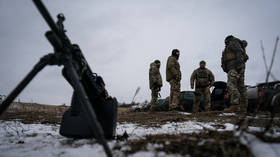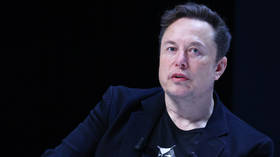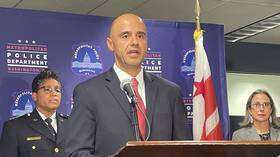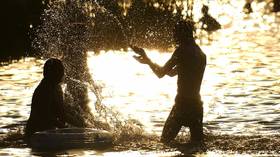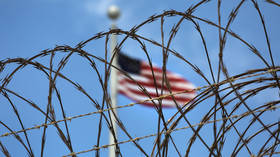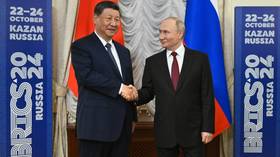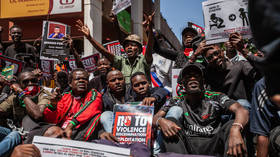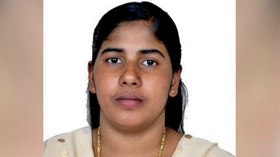Putin goes to Crimea – but where’s the Western outrage?
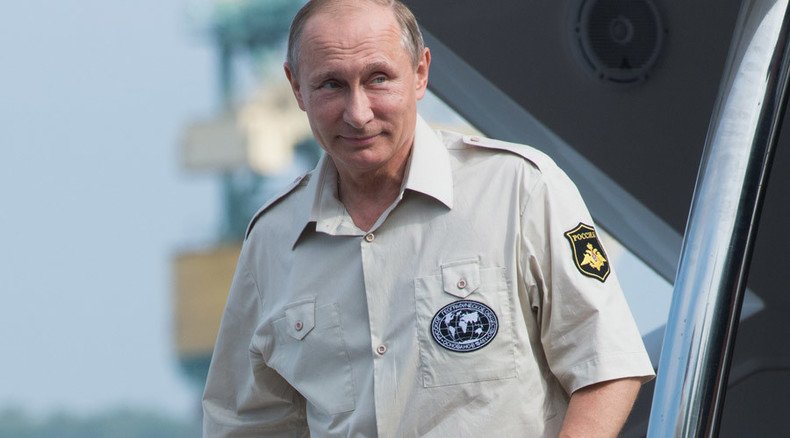
It’s almost eighteen months since the people of Crimea voted overwhelmingly in a democratic referendum to join the Russian Federation. President Putin visited Crimea, an event that was greeted with an unexpected Western media reaction.
Think back to March 2014, when the Crimean referendum took place. The condemnation of Russia was intense. Putin paid a visit to Crimea in May of that year following the ‘annexation’. This triggered a tough response from Washington. “Crimea belongs to Ukraine and we don’t recognize of course the illegal and illegitimate steps by Russia in that regard,” declared US State Department Spokeswoman Jen Psaki.
Putin’s visit to Crimea this week - when he took a dive in a mini submarine to explore Byzantine era wreckage off Crimea’s Black Sea coast - was noticeably different. There were jibes about Putin looking like ‘a Bond villain;’ there were jokes about him looking for signs of the ruble; there were also references to the Kursk submarine disaster, which took place fifteen years earlier.
Anti-Putin activists claim President Putin keeps doing stunts in submarines so search engines find fewer references to Kursk sub tragedy
— Daniel Sandford (@BBCDanielS) August 18, 2015However, Ukraine’s President Poroshenko’s fierce condemnation of the visit - he called it “a challenge to the civilized world” - seemed to fall on deaf ears, as none of the major Western leaders criticized Putin’s trip to the ‘annexed’ peninsula.
This lack of outrage was mirrored in the Western MSM coverage.
Sky News referred to Putin as “daring.” CNN in its coverage of the event used Sevastopol, Crimea as the locator and not Ukraine (though they did state on their website that Crimea was “Ukrainian territory”). Putin’s visit was described elsewhere as ‘controversial’, but that’s about as far as it went.
How much should one read in to all of this? The muted reaction to Putin’s visit is not the only sign that things could be calming down. Crimea has already been visited by a delegation of French MPs from Nicolas Sarkozy‘s Republican Party. Italian Parliamentarians have announced plans to visit. It’s been reported that Polish MPs are mulling a trip to the peninsula, as are MPs from Germany’s progressive Die Linke party.
It’s ludicrous to think that they’re all going there just to bring back some cheap cigarettes.
“I think that the French parliamentarian’s trip was a right thing to do. Being elected by the people it was their duty to tell and show the official French authorities, politicians and the society as a whole what is really going on in Crimea right now. This is a correct and demonstrative decision,” Die Linke’s Alexander Neu said.
The very fact that delegations of Western politicians are going - and planning to go - to Crimea tells us that they don’t think it will cost them domestic popularity - which is revealing in itself. It shows that you can win political points on the Crimea issue in Europe.
It’s not just politicos who are making their way to the peninsula, but music stars too. American rock star Joe Lynn Turner, a former vocalist with Rainbow and Deep Purple, arrived in Crimea this week to give a series of concerts.
“I know the truth lives here. And I believe right now, this time Russia is going to be the great power that it already has been and that good always overcomes evil,” Turner told reporters.“I was warned I could be banned in Europe [for giving concerts in Crimea]… but I am a rebel, I have always been a rebel and I will always stay a rebel. I do not care what they say.”
“I’ve listened to every leader in the world. The only one telling the truth is Putin,” Turner said.
Also this week, the Italian tenor Federico Lepre of La Scala, Milan, performed in Yalta in Crimea with Russian singer Natalia Pavlova-Colantoni of the Moscow State Conservatory.
The hope of the neocons that a strict Western boycott of Crimea would be observed has clearly not been realized. Even though visiting the province doesn’t necessarily mean endorsement of it being part of Russia - it does show cracks in the ‘hard-line’ approach. Singers, literally and metaphorically, are walking away from the West’s chorus of condemnation.
Here’s why it’s happening. For a start, the neocons argument, which goes something like, “Crimea’s annexation by Russia proves that Putin is the new Hitler,” never really gained much traction - certainly not among the general public.
Such a position was fatally weakened by the fact that Crimea was part of Russia between 1783 and 1954 (when it was transferred to the Ukrainian Soviet Socialist Republic by Khrushchev) and the fact that the majority of people who live there are, er, Russians. You don’t have to be a hardcore Russian nationalist with the Russia flag tattooed on your biceps to acknowledge that Russia does have pretty strong claims to the province.
Western journalists who do know a bit of regional history have undermined the neocon cause.
Peter Hitchens, a columnist for Britain’s Mail on Sunday newspaper wrote ’A (not so brief) history of Crimea’ that provided some much needed historical background.
He also highlighted Western double standards on the Crimean referendum in another piece entitled, ‘Why don’t we want democracy and self-determination for Crimea?’
In The Guardian, Seumas Milne, in an article entitled, 'The clash in Crimea is the fruit of Western expansion,' wrote that: “Western denunciations of Russian intervention in Crimea have reached new depths of self-parody.”
READ MORE: Kissinger: ‘Breaking Russia has become objective for US’
In the Sunday Telegraph, in December 2014, Christopher Booker wrote: “Quite one of the oddest and most frightening stories of the year has been the ludicrous and persistent misrepresentation in the West of the reason for the tragic shambles unfolding over Russia and Ukraine. This has been presented as wholly the fault of the Russian ‘dictator’ Vladimir Putin, compared by Hillary Clinton and the Prince of Wales to Hitler, for his ‘annexing’ of Crimea… it was entirely predictable that Russia and the ethnic Russians of eastern Ukraine would respond as they have done. So, too, was the wish of the vast majority of Crimeans, 82 percent of them Russian speakers, to rejoin the country of which they were part for most of two centuries.”
The political context surrounding the return of Crimea to Russia also weakened the Russophobes’ case. Let’s not forget Crimea would still be part of Ukraine today had it not been for the Western-sponsored toppling of a democratically elected government in Kiev in February 2014. Crimea’s referendum was a direct consequence of a ’regime change’ which Western leaders welcomed.
That regime change shattered the consensus under which the country had been governed since the end of the Soviet Union, and which reflected the divisions in the country. The basis of that consensus was that democratic election results would be respected, and that the leaders of Ukraine would also make compromises on foreign policy orientation - maintaining friendly relations with both Russia and the West and not going out of their way to antagonize either.
The consensus also meant respecting the full language and other rights of Ukraine’s minorities. All that was shattered by what happened in February 2014. Ukraine’s Russian population felt threatened by the ousting of a President and a government they had largely supported - and in particular were concerned over the prominent role that virulently anti-Russian far-right groups played in the so-called ‘democratic’ uprising.
READ MORE: US boxer Roy Jones Jr. asks for Russian passport over cup of tea with Putin in Crimea
Regardless of whether or not we regard the referendum of March 2014 as legal or illegal, constitutional or unconstitutional, it’s easy to understand why the majority of people of Crimea decided that with neo-Nazis on the rampage and a fiercely anti-Russia administration in power in Kiev, it was time to say ’dosvedanya’ to Ukraine and return to Mother Russia.
The case for regarding Crimea’s return to Russia as the most heinous of crimes has also not been helped by the observable fact that those who cried most loudly about how ‘outrageous’ Crimea’s ‘annexation’ was, were also cheerleaders for the illegal invasion of Iraq.
Asked which was worse - illegally invading a sovereign state on the basis of whopping big lie (WMDs) in order to grab its resources and extend your regional hegemony - or a province retuning to a country it had been part of for the best part of two centuries after a referendum - then all but the wild-eyed inhabitants of Planet Neocon would say the former. Let’s not forget too that up to one million have lost their lives following the illegal ‘Shock and Awe’ invasion of Iraq - while the ‘heinous annexation’ of Crimea that had the West’s endless war lobby foaming at the mouth, was relatively bloodless - with only one Ukrainian soldier unfortunately killed.
Today, three positions on Crimea can be discerned. We can take the line that there the return of the province was entirely legitimate. The referendum was democratic and represented the will of the people. It couldn’t be unconstitutional, because violent toppling of a democratically elected government in Kiev meant that the old Ukrainian constitution was effectively torn up.
We can take the neocon line that holding a referendum was an act of aggression on a par with the Nazis attacking Poland/Czechoslovakia/Low Countries, etc and was a sign that ‘Russian imperialism’ threatens the entire world (unlike the ‘benign’ liberal invasions, oops, interventions, against sovereign states that the US and its allies have engaged in over the past 20 years and which have, er.. brought so much peace and stability to the Middle East and beyond).
Or we can take a third position, which is the one I’d say reflects where quite a few Western politicians are now, even though they might not openly admit it for fear of being branded ‘Putin appeasers.' This position is: “While we believe Ukraine’s territorial integrity should have been maintained, it’s hardly worth risking world war three over to get a historical province of Russia, populated by Russians to return to Ukraine and we need to try and get things back to normal.”
The reality is Crimea is now part of Russia again - and no amount of neocon rage will change this.
European businesses - and particularly manufacturing companies - are losing out over the anti-Russian sanctions and would like to see them lifted. There is no real appetite outside of Russophobic circles to push things further. A new Crimean war is highly unlikely.
It’s also important to point out that the West - whether it likes it or not - needs Putin’s cooperation on a number of issues, particularly in the Middle East. The nuclear deal with Iran was only achieved with the Kremlin’s help. If Western leaders are serious about defeating ISIS (admittedly a big ‘if’ considering how much Western powers and their regional allies have enabled ISIS), then Russia assistance will be crucial. In the words of that well known left-wing peacenik Henry Kissinger: “For the West the demonization of Putin is not a foreign policy - it’s an alibi for the absence of one.”
Crimea remains subject to harsh western sanctions and is likely to be referred to as ‘illegally annexed’ for quite some time yet. In March, the US vowed to maintain sanctions as long as Russia’s ‘occupation’ continued.
Nevertheless, the muted reaction to Putin’s visit this week must have made the neocons and those who do want to risk WW3 over Crimea rather concerned that things are gradually changing.
The statements, views and opinions expressed in this column are solely those of the author and do not necessarily represent those of RT.
LISTEN MORE:
The statements, views and opinions expressed in this column are solely those of the author and do not necessarily represent those of RT.



